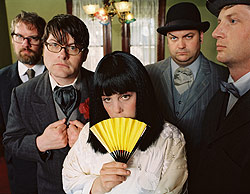 |
It’s a musical experiment on the grandest of scales: Tonight the Portland-based rock band The Decemberists sit down with 82 classical musicians from the Grant Park Orchestra to play an hourlong set in Millennium Park. Pre-concert, I chatted with The Decemberists’ lead singer, Colin Meloy, who collaborated with classical composer Sean
O’Loughlin on the arrangements.
Q: Rock bands have always found Chicago’s city parks tough to crack. In recent memory, the only big downtown concerts have been Radiohead, Tori Amos, and, more recently, Lollapalooza. How did you guys sneak through?
A: I don’t know. I didn’t know that there was such friction between the rock community and downtown Chicago. We were moving sort of blindly, and [and the offer] sort of surprised us as well. It seemed like a fun proposition.

Meloy |
Q: Where did the idea to play a five-city, orchestral tour originate?
A: A promoter in LA suggested that we do a show at the LA Philharmonic. They had done it in the past, most notably with Belle and Sebastian, and that sounded really exciting. Promoter had the idea to make a tour of it, and said there were always local Philharmonic orchestras that would be into playing with a rock band from time to time.
Q: Looking back on your repertoire, how did you decide which songs could withstand full orchestral treatment? I mean, some of my favorite songs by you guys are ever so simple.
A: Basically we went through our material and found the stuff that either had existing string parts that we had built in studio, or certain songs that sounded like they’d sound good with orchestration. We’re pulling a lot from entire body of work, not just the new record. We have an hour of material with orchestra, using that as economically as possible.
Q: Do you rehearse with the Grant Park folks? Or just show up and wing it?
A: For a lot of the shows, we are winging it, but for professional symphonies, nothing is ever wung. Is wung a word? We [had] two days of rehearsal with the LA Philharmonic, as much for us and the composer, so we [could] hear arrangements and see what they sound like. [In Chicago] there will be a brief rehearsal at sound check.
Q: I read once in an interview that you intended to have a solo career. To go from a one-man act, to a band, to performing live with near 90 people, is quite the opposite of how you set out.
A: When I moved to Portland in 1999, I felt most comfortable playing solo. I didn’t know that many people, and I was dead set on being a solo performer, but I wasn’t getting any shows. People said that if I got a band together I was imminently more bookable.
Q: Does it make you nervous, then, to suddenly find yourself among 82 pros?
A: I’ve always had a little bit of anxiousness around classically trained musicians. I had some guitar lessons in college, but my guitar teachers were the Jesus and Mary Chain and Johnny Mars. I know so little about theory that for a person who makes a living as a musician it’s embarrassing. Luckily I play with classically trained musicians so they can puzzle it out for me. I just write the songs, so I feel like I get a little bit of a clean bill of health there. Nobody is going to attack the guy who writes the songs.
Photography: Autumn de Wilde/Courtesy of bighassle.com



